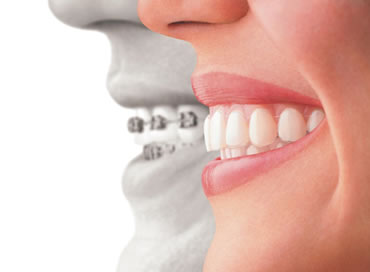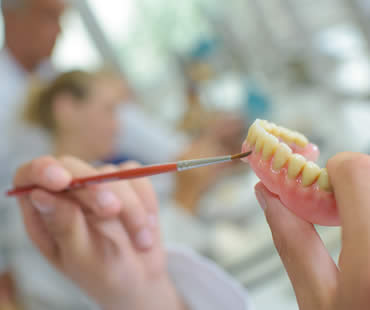
One of the most recent innovations in modern orthodontics is Invisalign. These unique clear aligners are becoming increasingly popular for improving smiles without the stigma associated with traditional braces. Invisalign aligners straighten teeth by placing gentle pressure on them to move into better positions. This solution offers distinct advantages to some of the other options in orthodontics.
Hidden appearance:
One of the most obvious benefits of Invisalign is that the clear plastic is practically invisible in your mouth. The subtle appearance of the retainers is much less obtrusive than traditional metal braces. For patients who want to diminish the fact that they are undergoing orthodontic treatment, Invisalign in the perfect solution. Personal and professional relationships are not at risk of embarrassment due to being self-conscious about your smile.
Easy removal:
You will remove aligners from your mouth when eating or performing oral hygiene tasks. There are no impacts to your diet during Invisalign treatment, since you take out the aligners anytime you eat. Brushing and flossing are performed normally without having to worry about cleaning food debris out of intrusive wires and brackets. This can have positive impacts on your oral health as well.
Increased comfort:
The lack of metal pieces in the aligners means a more comfortable experience. Traditional braces have a reputation for poking the mouth or breaking. Invisalign offers a clear advantage of being very comfortable when worn.
Boosted confidence:
No matter if you are a teenager or an adult wearing braces, it can be embarrassing to have a mouth full of metal in your smile. The invisible quality of Invisalign eliminates those self-conscious feelings, giving you the confidence to smile, laugh and eat as usual even while undergoing treatment.
If these benefits of Invisalign sound appealing to you, schedule an appointment with a qualified orthodontist who provides this type of treatment. It may be the winning route to your beautiful smile.
We treat patients from Meriden and the surrounding area

An embarrassing smile can ruin your ability to smile freely, opting to hide your teeth so that others can’t see them. Dental veneers, thin shells often made of porcelain attached to the fronts of your teeth, transform your smile to one you can display with pride. They are customized for each patient to give you the look you desire.
There are numerous dental problems that can be hidden with porcelain veneers. Common reasons that people choose veneers include tooth discoloration, chips, breaks, worn down teeth, gaps, misalignment or misshapen teeth. These restorations cover all of these problems and more, giving you the perfect smile.
The process for getting veneers is not painful and usually requires a few trips to the dentist. First you’ll need a consultation to determine if you are a good candidate. You should tell the dentist exactly what you dislike about your smile and learn if veneers can correct those issues. If so, your next appointment will include preparing your teeth by removing a small amount of your enamel so the veneers can be attached. Your dentist will make an impression of your mouth so that veneers can be crafted in a lab to fit exactly. The last step is a visit to have the final veneers bonded to your teeth, adjusted, and polished for a flawless appearance.
You can count on porcelain veneers to resist stains so that they continue to look just like they did when applied. You can choose the veneer color to get just the shade you desire, and your smile will look very natural. Another benefit is that your gums should adjust very easily to porcelain veneers. Keep in mind, however, that veneers are a permanent solution and if they do become damaged it’s likely you’ll have to completely replace them. The lifespan of veneers is often ten years or more, and they don’t require any special care other than normal dental hygiene.
Veneers provide patients with the ability to turn their smiles around for good. If you’re unhappy with the look of your teeth, consult your dentist to see if veneers will help you regain your confidence.
If you live in the Meriden area contact us today

Dental implants are used to replace individual or missing teeth or to anchor loose dentures. For many patients with these issues, traditional dental implants may not a viable option. For example, a patient who does not possess adequate bone levels to anchor the implants would not be a good candidate for traditional dental implants. With mini dental implants, the bone required to anchor the implant successfully is much less.
Thanks to advances in implant dentistry, these patients have other options. Mini dental implants have emerged as an attractive choice for cases that are not conducive to the placement of traditional implants. For the patient who has inadequate bone, the bone required to successfully anchor mini dental implants is much less. Unlike traditional implants, the placement procedure for mini dental implants is a minimally invasive procedure that can be completed in one appointment by a specially trained general or family dentist. Because the procedure is less involved, the pain and length of recovery is greatly diminished.
Patients who have existing health conditions that would preclude them from more invasive surgery may find mini dental implants an extremely appealing option. Mini implants are also a perfect choice for restoring one missing or damaged tooth. Should implant failure occur, grafting procedures would not be necessary because of the small size with mini dental implants.
Most importantly, mini dental implants maintain the look, feel and function of your natural teeth. While you have to wait months for traditional implants to fuse with the bone, mini dental implants are ready for immediate use. Talk to your dentist to determine if mini dental implants would be a good option for your dental restorations and get ready to face the world with a confident new smile.
If you live in the Meriden area contact us today

Severely damaged, injured or diseased teeth can lead to not only cosmetic problems with your smile, but also functional ones. Your dentist may recommend dental crowns or dental bridges to treat your dental issues.
Dental crowns are a restorative dental therapy that covers the affected tooth completely, serving as the new outer surface of the tooth. A dental crown maintains the natural roots of a tooth and can prevent extraction. A dental bridge fills the gap left by one or more missing teeth and is affixed to bordering teeth with an anchoring crown.
Both dental crowns and dental bridges are made from a variety of materials that can be designed to match the color of your surrounding natural teeth. As opposed to removable prosthodontics such as full or partial dentures, dental crowns and bridges are permanently bonded to existing teeth or dental implants, allowing them to function and appear as natural teeth.
Dental crowns and bridges have a number of advantages and benefits, such as:
- Dental crowns protect the natural tooth after a root canal therapy, helping to prevent bacteria re-infecting the tooth that could lead to extraction.
- Dental bridges restore gapped or missing teeth, providing support to the surrounding teeth, preventing them from shifting in to fill the empty space and affecting your speech, bite and smile.
- Your dentist can typically place dental crowns and bridges in as few as two appointments.
- Dental crowns and bridges are both long-lasting, durable therapies, designed to protect your natural tooth for years to come.
- Dental crowns prevent bone loss by preserving the natural tooth roots, thereby stimulating the jawbone, preventing resorption, or shrinkage, of the bone following extraction.
If you have questions about what a dental crown or bridge can do to improve the form and function of your smile, talk to your dental professional today. You can restore your healthy smile and preserve it for years to come with a dental crown or dental bridge treatment.
We treat patients from Meriden and the surrounding area

Thanks to advances in dental technology, dentures are more natural looking and comfortable than ever before. If you are one of the many adults wearing dentures to replace missing teeth, there are several do’s and don’ts you will want to follow to ensure they maintain their fit and your oral health:
- Do take your dentures out before going to bed, allowing your mouth tissues to rest from wearing them all day.
- Don’t let your dentures dry out. Soak them in mild denture solution or water while you sleep.
- Do clean them daily with either a mild detergent or special denture cleaning solution and a soft-bristled brush.
- Don’t soak them in very hot water, as this could cause them to warp, and they will no longer fit properly.
- Do handle them with care. Dropping your dentures or treating them with strong cleansers or harsh brushes can do permanent damage.
- Don’t neglect your oral care for the rest of your mouth. Even patients with a full set of dentures need to take care of their gums, and if you have partial dentures you should continue to brush and floss your remaining teeth regularly.
- Do pay attention to changes in the fit or feel of your dentures. Problems with fit can lead to irritation and discomfort, and could also be an indication of gum disease.
- Don’t try to adjust or repair your dentures on your own. If your dentures are ill-fitting or damaged in any way, schedule an appointment with your dentist to have them evaluated.
- Do continue to see your dentist for regular checkups to help maintain your best oral health and check your dentures for fit and function.
If you are missing all or some of your teeth, dentures can greatly improve both your appearance and the quality of your life. By following these simple guidelines, you can maintain the beauty and functionality of your dentures for many years.
If you live in the Meriden area contact us today

Dentistry today does not just include treatments for tooth and gum problems or diseases. The trend in dentistry has expanded to include a wide range of treatments and procedures with the purpose of improving your appearance. The purpose of cosmetic dentistry is to give you the most appealing smile possible so that you can be happy with your look and have an improved self-esteem. Here are some trends in cosmetic dentistry explained.
Bonding
Mild to severely damaged teeth can be treated with dental bonding. A tooth-colored material is applied to the fractured or chipped surface of your tooth and then bonded with a special light. The restoration provides a renewed look to your tooth so that others can’t even tell it was ever damaged.
Teeth whitening
A bright white smile gives of a great impression of oral health and beauty. Stains from age, foods, drinks, and habits like smoking all play a role in making your smile dull and unattractive. Cosmetic dentists offer teeth whitening procedures that can turn your smile around in just an hour.
Veneers
Another way to easily improve your smile is dental veneers. These thin shells usually made of porcelain are permanently adhered to the fronts of your teeth, giving you a bright and flawless smile for many years to come.
Contouring
Instead of having lengthy orthodontic treatment to correct crooked teeth or uneven spacing, contouring is an option to improve your look. Also called tooth reshaping, this procedure is additionally used to correct irregularly shaped teeth and alter issues like overly pointy teeth. During contouring, small amounts of tooth enamel are removed in order to change the tooth’s shape, length, or surface.
Implants and dentures
To replace missing teeth, dental implants are dentures are both options depending on the patient and the specific situation. Many people prefer implants because they are a permanent and secure solution.
Cosmetic dentist in Meriden














